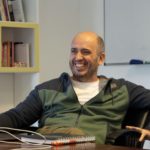Throughout history, humanity has faced various concerns. Some issues like creating appropriate shelter, have been resolved or at least mostly resolved. Others, up to this day, remain unsolved: healthcare, to me, stands out as a critical one. As a species with a collective consciousness, our instinct for safety drives us to find solutions for healthcare challenges. This is why entire professions have emerged, and countless lives have been dedicated to the pursuit of well-being.
At Arionkoder, the Digital Product Design company I run, our commitment to crafting better futures for humanity is what motivates us to help healthcare advance. I believe that access to healthcare is a birthright and it’s our duty as builders of tomorrow to widen its reach. However, to actually turn these beliefs into results we must understand, in depth, the many stages that healthcare projects go through. And I’ll go even further: this understanding can’t be gained from merely observing, but rather from hands-on involvement that goes from the initial spark of an idea to its realization and actual materialization of meaningful impact.
In my perspective, the evolution of healthcare unfolds across four stages:
Basic sciences • Applied sciences • Production • Distribution
1. Basic Science
At this stage, the emphasis is placed on expanding existing knowledge within a specific field. This involves rigorous research that often results in published papers. This phase is both intriguing and essential, as it acts as a constant reminder to uphold scientific standards such as replicability, certainty, consistency, and predictability.
A prime example of our involvement in this phase is our partnership with a prime international research organization, where we’re applying Computer Vision to assist in lab activities that demand researchers’ repetitive actions and time, such as cell culture count. This frees them up to dedicate their attention to other elements of their investigation, aimed at programming viruses to fight cancer cells.
2. Applied Science
In this phase, the theories explored in papers begin to take shape as practical concepts with potential applications. This can manifest in several ways, from clinical trials to building minimum viable products (MVPs). These tangible manifestations offer solutions to real-world challenges.
A case in point is our work with a new brain framework that measures brain hemispheres through scans and detects neurodegenerative diseases such as dementia based on those images. We’re currently training the Machine Learning model to be able to interpret those scans with accurate, quick results that help doctors obtain valuable insights and patients start their best treatments.
3. Production
As ideas transition into solutions, we focus on turning them into functional products that can be scaled up for wider impact. Whether it’s refining an MVP into a market-ready product or converting the outcomes of clinical trials into effective treatments, design becomes a key factor for success. A user-centric approach, coupled with anthropological insights, becomes the stepping stone for success.
A tangible example of this stage is our work on a solution designed to aid in the prevention of diabetic retinopathy. By employing Machine Learning to detect signs of the disease through non-invasive eye scans, we’re addressing a critical health challenge with a tested scientific solution in order to meet a staggering global demand from diabetic population.
4. Distribution
With a viable solution in hand, our attention shifts to delivering it to the intended users. From getting a COVID-19 vaccine to using specialized apps for glucose measuring, the goal is to reach those who stand to benefit from these solutions.
We have been privileged to work in numerous projects at this stage, like OncoRx Insights, which aids patients and oncologists in their battle against cancer using AI to detect the best treatments for the disease’s specific genomic signature, or Live Chair Health, which extends gamified healthcare access to vulnerable populations.
We believe that prioritizing health is at the heart of our mission of creating better futures for humanity. To drive innovation and breakthroughs in healthcare, close engagement with these projects is everything. Because at the end of the day, it’s not just about creating great digital products or developing outstanding Artificial Intelligence solutions: it’s about changing lives. I invite you to envision a future where healthcare is universally accessible with swift and tangible results, and build it for us all.
